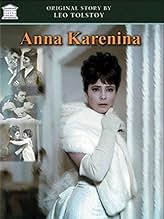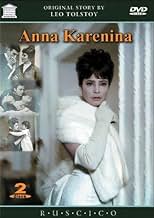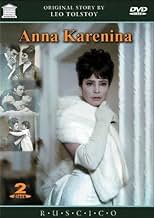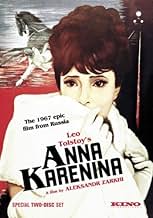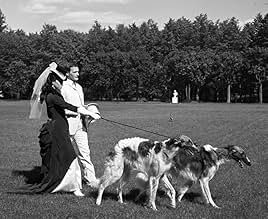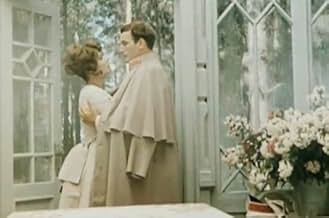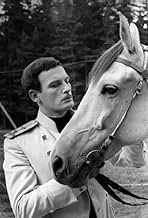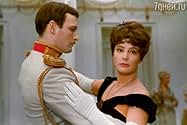IMDb RATING
7.0/10
1.1K
YOUR RATING
Anna Karenina is a young wife of an older husband. She has an affair with the handsome Count Vronsky. By following her desires Anna complicates her life.Anna Karenina is a young wife of an older husband. She has an affair with the handsome Count Vronsky. By following her desires Anna complicates her life.Anna Karenina is a young wife of an older husband. She has an affair with the handsome Count Vronsky. By following her desires Anna complicates her life.
- Director
- Writers
- Stars
Yuriy Yakovlev
- Stiva Oblonsky
- (as Yu. Yakovlev)
Boris Goldayev
- Konstantin Levin
- (as B. Goldayev)
Anastasiya Vertinskaya
- Kitty
- (as A. Vertinskaya)
Iya Savvina
- Dolly
- (as I. Savvina)
Maya Plisetskaya
- Knyagina Betsy
- (as M. Plisetskaya)
Lidiya Sukharevskaya
- Lidiya Ivanovna
- (as L. Sukharevskaya)
Elena Tyapkina
- Knyagina Myagkaya
- (as Ye. Tyapkina)
Sofiya Pilyavskaya
- Grafina Vronskaya
- (as S. Pilyavskaya)
Andrey Tutyshkin
- Lawyer
- (as A. Tutishkin)
Vasili Sakhnovsky
- Seryozha
- (as Vasya Sakhnovsky)
Anatoliy Kubatskiy
- Camerdiner Kapitonich
- (as A. Kubatsky)
- Director
- Writers
- All cast & crew
- Production, box office & more at IMDbPro
Featured reviews
This film re-creates the historical setting of the 1860s brilliantly, then spoils it all with an Eisensteinian-expressionistic style of acting and photography that gives one the giggles with its melodramatic jerkiness. Worst of all is Rodion Shchedrin's shrill, strident score. It would be too loud and insistent for an axe murder in an insane asylum; in a drawing room from the reign of Alexander II it sounds simply ludicrous and irritating.
Vasili Lanovoy is handsome and romantic-looking as Count Aleksey Vronsky—his stiff bearing probably correct stylistically, his costumes wonderful. He does love to stare and lurch in that "I-am-Ivan-the-Terrible's-kid-brother" manner of Soviet film. His hair piece is not very good, either.
Lanovoy does at least very much look his part, which is more than can be said of the woman playing Anna Karenina. She looks a lot more like Anna Magnani, complete with black moustache. Mme Karenin is supposed to be an extraordinary aristocratic beauty, a being from the highest society. Here she looks like she has strayed from a film by Pietro Germi. The actress likes bombastic reactions right out of Mexican television drama, which the camera captures with Shchedrinesque careenings.
That great acting was possible, even in this school of film, is witnessed to by the master player of the role of Aleksey Karenin, Nikolai Gritsenko (1912–1979). He is quite unforgettable and detailed; he helps one understand Tolstoy better.
Most of the film is the other way around: one would hardly understand anything if one had not previously read the novel. The abrupt and disconcerting editing doesn't help.
No film could ever hope to do justice to such a literary masterpiece, but Clarence Brown's 1935 version is incomparably more satisfactory. Too bad. This could have been wonderful.
Vasili Lanovoy is handsome and romantic-looking as Count Aleksey Vronsky—his stiff bearing probably correct stylistically, his costumes wonderful. He does love to stare and lurch in that "I-am-Ivan-the-Terrible's-kid-brother" manner of Soviet film. His hair piece is not very good, either.
Lanovoy does at least very much look his part, which is more than can be said of the woman playing Anna Karenina. She looks a lot more like Anna Magnani, complete with black moustache. Mme Karenin is supposed to be an extraordinary aristocratic beauty, a being from the highest society. Here she looks like she has strayed from a film by Pietro Germi. The actress likes bombastic reactions right out of Mexican television drama, which the camera captures with Shchedrinesque careenings.
That great acting was possible, even in this school of film, is witnessed to by the master player of the role of Aleksey Karenin, Nikolai Gritsenko (1912–1979). He is quite unforgettable and detailed; he helps one understand Tolstoy better.
Most of the film is the other way around: one would hardly understand anything if one had not previously read the novel. The abrupt and disconcerting editing doesn't help.
No film could ever hope to do justice to such a literary masterpiece, but Clarence Brown's 1935 version is incomparably more satisfactory. Too bad. This could have been wonderful.
Whoever cast Tatyana Samojlova as Anna has some explaining to do. This film would be beautiful if it weren't for the star, who completely ruins every scene she's in. She is a terrible actress and her unattractiveness is a serious problem, as we are supposed to love Anna's grace and beauty. This is why her character is so tragic: this great beauty married to an old bore - we're supposed to understand why she follows her heart and goes for Vronsky, and even sort of root for her, believing she deserves her 'grand amour.' None of this comes through as you just hate Anna and her gigantic head. The film is ruined. Nepotistic casting at its most pernicious!
I must agree with 'iliawarlock' on Samoylova's performance - but even though this is undoubtedly the weakest link, the film doesn't hold on many stronger points. Samoylova, who is best suited to play Soviet peasant or worker, is only the emanation of the overall psychological flatness, ignorance and self-content, characteristic of many destroyer-of-classic-texts communist era films. Plisetskaya is brilliant, and Lanovoy is also delightful. An interesting fact is that, before a screening which took place in Sofia, Bulgaria, the still magnificent Vasiliy Lanovoy commented that his character Vronsky was incapable of the great love which Karenina had the gift for. From his performance, I got quite the opposite impression of a highly sensitive and devoted Vronsky - but thats the greatness of a complex text. Too bad we cannot witness a complex (if any) psychological interaction with Karenina in this dramatization.
10alyona-m
Alexander Zarkhy's "Anna Karenina" is the best Karenina in the world. May be it's even better then Leo Tolstoy's romance :)) I've seen a lot of films on this romance, but no one of them, IMHO, compares to this one.
Anyway, Tatyana Samoylova is great actress, and Anna's meeting with her son Serezha is one of the most touching and heartbreaking cinema episode I've ever seen.
Tatyana Evgenyevna, ya ochen' Vas lublu :))
Anyway, Tatyana Samoylova is great actress, and Anna's meeting with her son Serezha is one of the most touching and heartbreaking cinema episode I've ever seen.
Tatyana Evgenyevna, ya ochen' Vas lublu :))
Previous to seeing this, the best version was Greta Garbo's with Vivien Leigh's close behind, while the Joe Wright-directed adapted fared least. Tolstoy's Anna Karenina is one of the greats of all Russian literature, and while this 1967 Russian version is not quite perfect and not for all tastes it does a great job with the story and gets closer than most of the other adaptations in capturing the detail and the spirit of the work, rather than just being the basic details in Cliff Notes version.
Some of the editing is a little abrupt in places and Anna and Vronsky seemed to fall in love too quickly, as if there was intended to be a few scenes in the film explaining Vronsky's infatuation that was cut out when it shouldn't have been. The print that the film comes in on the DVD is rather questionable, the constant colour shifts, the fading in and out, the washed out look and compression indicating a print that was badly damaged in the transfer.
Anna Karenina (1967) is, generally, visually well-made. The film contains some really striking cinematography, especially in the wonderfully delirious horse race scene and the tracking shots that allows one to admire all those splendid rooms and interiors in all their glory, haunting use of colour and 1860s Russia is evoked brilliantly in the truly sumptuous period detail. Rodion Shchedrin's music score is not for all tastes admittedly (with a few of the more dissonant parts a touch shrill), but this viewer found it beautiful and effectively chilling, the horse race and ballroom scenes being particularly well-scored.
The script is very literate and remarkably nuanced, capturing the spirit of Tolstoy's prose better than the other filmed versions. In terms of faithfulness, there could have been more with Anna and Vronsky's infatuation and descent into love, Levin is present but we don't get a sense of why he is so important a character and Levin and Kitty's subplot deserved better than being mentioned briefly. Other than those things though, this film is one of the more faithful, in detail and spirit, treatments of the book and despite the somewhat short length it has more depth than most of the other adaptations. There are some unforgettable scenes here, the horse race certainly is one but one cannot mention the very romantic ballroom scene, the scene in the theatre and the heart-wrenching suicide scene. The characters are still interesting, and the important parts of the story covered well, not just being a genuinely poignant love story but also a tense and unbearably tragic social drama too (one of the few Anna Karenina adaptations to achieve that balance).
The performances are uniformly good, with Tatyana Samoylova making for a very heartfelt Anna and bringing many nuances to the part in a way that was achieved by Garbo and not quite as much by the others. Vasily Lanovoy is a dashing Vronsky, but manages to bring depth to him, instead of being just a handsome heroic figure he is pretty un-heroic and unsympathetic actually. And there has unlikely been a more haunting Karenin on film than that of Nikolai Gritsenko. Yuri Yakovlev is amusing as Stiva, and Maya Plisetskaya (one of the greatest ballerinas of her day and of all time and wife of the film's composer Rodion Shchedrin) is a terrific Betsy.
In conclusion, imperfect but very good film, and compares extremely favourably with the rest of the Anna Karenina adaptations. 8/10 Bethany Cox
Some of the editing is a little abrupt in places and Anna and Vronsky seemed to fall in love too quickly, as if there was intended to be a few scenes in the film explaining Vronsky's infatuation that was cut out when it shouldn't have been. The print that the film comes in on the DVD is rather questionable, the constant colour shifts, the fading in and out, the washed out look and compression indicating a print that was badly damaged in the transfer.
Anna Karenina (1967) is, generally, visually well-made. The film contains some really striking cinematography, especially in the wonderfully delirious horse race scene and the tracking shots that allows one to admire all those splendid rooms and interiors in all their glory, haunting use of colour and 1860s Russia is evoked brilliantly in the truly sumptuous period detail. Rodion Shchedrin's music score is not for all tastes admittedly (with a few of the more dissonant parts a touch shrill), but this viewer found it beautiful and effectively chilling, the horse race and ballroom scenes being particularly well-scored.
The script is very literate and remarkably nuanced, capturing the spirit of Tolstoy's prose better than the other filmed versions. In terms of faithfulness, there could have been more with Anna and Vronsky's infatuation and descent into love, Levin is present but we don't get a sense of why he is so important a character and Levin and Kitty's subplot deserved better than being mentioned briefly. Other than those things though, this film is one of the more faithful, in detail and spirit, treatments of the book and despite the somewhat short length it has more depth than most of the other adaptations. There are some unforgettable scenes here, the horse race certainly is one but one cannot mention the very romantic ballroom scene, the scene in the theatre and the heart-wrenching suicide scene. The characters are still interesting, and the important parts of the story covered well, not just being a genuinely poignant love story but also a tense and unbearably tragic social drama too (one of the few Anna Karenina adaptations to achieve that balance).
The performances are uniformly good, with Tatyana Samoylova making for a very heartfelt Anna and bringing many nuances to the part in a way that was achieved by Garbo and not quite as much by the others. Vasily Lanovoy is a dashing Vronsky, but manages to bring depth to him, instead of being just a handsome heroic figure he is pretty un-heroic and unsympathetic actually. And there has unlikely been a more haunting Karenin on film than that of Nikolai Gritsenko. Yuri Yakovlev is amusing as Stiva, and Maya Plisetskaya (one of the greatest ballerinas of her day and of all time and wife of the film's composer Rodion Shchedrin) is a terrific Betsy.
In conclusion, imperfect but very good film, and compares extremely favourably with the rest of the Anna Karenina adaptations. 8/10 Bethany Cox
Did you know
- TriviaFinal film of Lyudmila Semyonova.
- How long is Anna Karenina?Powered by Alexa
Details
- Release date
- Country of origin
- Official site
- Language
- Also known as
- Anna Karenina
- Filming locations
- Production company
- See more company credits at IMDbPro
- Runtime2 hours 25 minutes
- Aspect ratio
- 2.20 : 1
Contribute to this page
Suggest an edit or add missing content


